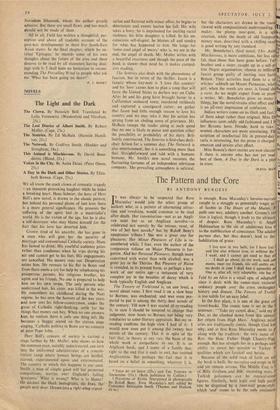NOVELS
The Light and the Dark
WE all know the stock clown of romantic tragedy,
--an innocent provoking laughter while he hides a breaking heart. Hans Schnier, the hero of Herr
Boll's new novel, is drawn to the classic pattern, but behind his personal plaint of lost love there is a more general significance. He presents the
suffering of the spirit lost in a materialist's world. He is the victim of the age, but he is also a self-destroyer who may blame himself for the fact that his love has deserted him.
Grown tired of his anarchy, she has gone to a man who will give her the security of marriage and conventional Catholic society. Hans has turned to drink. His youthful audience pities rather than condemns when he trips during his act and cannot get to his feet. His engagements are cancelled. His money runs out. Desperation seizes him. He retreats to his flat in Bonn and from there emits a-cry for help by telephoning his prosperous parents, his religious brother, his agent and his friends. No one is prepared to help him on his own terms. The only person who understood him, his sister, was killed in the war. He remembers his childhood during the Nazi regime, he has seen the horrors of the war years and now sees his fellow-countrymen, under the guise of Catholic right-thinking, settle for the things that money can buy. When no one answers him, he realises there is only one thing left. He becomes a beggar seated on the station steps singing, 'Catholic politics in Bonn are no concern of poor Pope John. . .
Herr censure of society is carried a stage further by Mr. Muller, who shows us how the common man, suitably indoctrinated, can turn into the uniformed administrator of a concen- tration camp where human beings are herded, starved, experimented/ upon and exterminated. The country in which this happens is our own. Smith, a man of simple good will but perverted compulsions, worries over England's failing `greatness.' What is wrong? Who is to blame? He accuses the black immigrants, the Jews, the' people next door. Drawn into a right-wing organi- sation and flattered with minor office, he begins to deteriorate and events hasten his fall. His wife takes a lover, he is imprisoned for inciting racial violence, his little daughter is killed. In his un- conscious self-disgust, he blames all and sundry for what has happened to him. He longs for `some cool angel of mercy' who is. we set in the end, the angel of death. Mr. Muller writes with a beautiful exactness and though the pace of the book is slower than need be, it makes compul- sive reading.
The Sentries also deals with the phenomena of fascism, but in terms of the thriller. Jason is a fanatic whose key-note is `I love this country' and his `love' causes him to plan a coup that will force the United States to declare war on Cuba. After he and his gang have brought havoc to a Californian seaboard town, murdered ruthlessly and captured a coastguard cutter, we gather that Jason had little enough reason to love his country and we may take it that his action has sprung from an abiding sense of grievance. Mr. McBain sweeps the reader along at such speed that no one is likely to pause and question either the possibility or probability of his story. Bril- liantly constructed, The Sentries is first-class deck- chair fiction for a summer day. The Network is also entertainment, but it is something more than that. Straightforward and told with a humane humour, Mr. Smith's new novel recounts the fluctuating fortunes of an independent television company. The prevailing atmosphere is satirical,
but the characters are drawn in the rou viewed with compassionate understanding. maker, the plump near-gent, is a sp, creation, while the death of old Sampso money man, described with a chilling exa', is good writing by any standard.
Mr. Benedictus's third novel, This Ani Mischievous, is more ambitious, but less su ful, than those that have gone before. T brother and a sister, caught up in a self-pf tive Negro organisation, choose to infiltra fascist group guilty of inciting race hat Britain. Their activities lead them to a s witches' sabbath on Mount Parnassus, whe girl, when the revels are over, is found d a cave. As we might expect from so pro a writer, Mr. Benedictus gives us many, things, but the novel strains after effect and is an all-over impression of confusion.
Indian writers come on us thick and fast, of them adept rather than original. Miss D influences seem oddly old-fashioned and I her Byronic hero, Nirode, hard to take. women characters are more convincing. TA scription of intellectual life in present-day'' cutta is interesting, but the prose is charged- emotion and strains after effect.
Miss Bowen's short stories are now classics if there is anyone who has not yet read best of them, A Day in the Dark is a plea in store.
OLIVIA MA










































 Previous page
Previous page